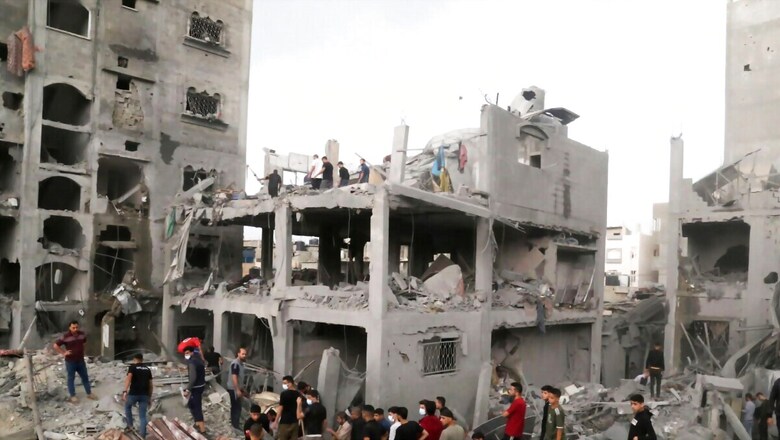
views
The existence of Hamas and its continued support by many countries recalls the debate of ‘good terror vs bad terror’, a matter that India has consistently been a victim of in international diplomacy and geopolitics.
Several countries, including Western nations, often refer to Pakistan-based terror organizations as merely militant groups, despite the primary goal of these terror outfits being the destabilization of India. Some, like branches of Al Qaeda and ISIS, advocate for India’s eradication, aiming to establish an Islamic caliphate in the most populous nation on Earth.
Many countries still regard Jammu & Kashmir and Ladakh as disputed territories. International maps occasionally challenge India’s sovereignty over these integral regions, raising concerns.
For numerous Islamic nations, Hamas represents a religious organization with a military wing fighting for what they perceive as a just cause — initially, the liberation of the Gaza Strip, followed by the capture of the West Bank, and ultimately the establishment of a Palestinian nation in the Palestinian Territory. Groups like Hamas, Hezbollah in Lebanon, Houthi rebels in Yemen, and various militias in Iraq, supported by Iran, believe they are fighting for righteous purposes. These groups are considered as freedom fighters, even if it means completely eliminating Israel, as stated in Hamas’s 1988 charter.
INDIA’S SITUATION
Much like what many nations have done in case of India, including the US, is supporting Israel militarily and economically after the Hamas terror rampage. The country bombed Syrian terror bases in retaliation of increased attacks on American allied forces in Syria and Iraq and deployed 900 more US troops in the Middle-East territory. US President Joe Biden visited Israel on October 18.
Official reports in the US often categorise Pakistan-based terrorist groups as militants. The latest ‘Annual Threat Assessment’ report from the US intelligence community highlights Pakistan’s extensive history of supporting anti-India “militant groups” and not “terror group”.
Evidently, official reports in the US and many other countries try not to write down Pakistan-based such outfits as terror groups even if the country is their birthplace with credible reports that its army and intelligence agencies train and sponsor them. Lashkar-e-Taiba (LeT) is one such terror group. LeT has long had a history of attacking India and was behind the Mumbai terror strikes, known as 26/11, that killed 166 people along with six Americans.
US policymakers, including those in the current Biden administration, acknowledge the long-overdue need for justice regarding the 26/11 attacks, questioning Pakistan’s intentions. However, when assessing the terror threat linked to Pakistan, their focus primarily revolves around groups that target the US or Western nations, such as Al Qaeda or its factions, ISIS or its factions, or the Haqqani Network.
TERRORISM VS MILITANCY
The distinction between a terrorist group and a militant group, or a terrorist and a militant, remains a question. The Government of India defines a terrorist act as “any act intended to threaten or likely to threaten the unity, integrity, security, economic security, or sovereignty of India, or to strike terror or likely to strike terror in the people or any section of the people in India or in any foreign country”.
According to the Federal Bureau of Investigation (FBI) in America, international terrorism involves “violent, criminal acts committed by individuals and/or groups inspired by or associated with designated foreign terrorist organizations or state-sponsored nations”.
The Office of the High Commissioner of United Nations Human Rights states that “terrorism involves the intimidation or coercion of populations or governments through the threat or perpetration of violence, causing death, serious injury, or the taking of hostages”.
Clearly, the target in terrorism is a nation, with political objectives. Governments and ordinary people become targets to achieve these objectives. In many cases, terrorism is state-sponsored, such as Pakistan’s involvement concerning India, or Iran’s involvement concerning Israel.
The term “militancy” lacks a standardized definition or agreed-upon terminology by credible institutions or countries. The Cambridge Dictionary defines it as “being active, determined, and often willing to use force” to achieve something. The Oxford Dictionary describes it as a tool or willingness to use force or strong pressure, especially to achieve social or political change. Britannica defines it as “having or showing a desire or willingness to use strong, extreme, and sometimes forceful methods to achieve something”, like militant protesters or a militant foreign policy.
Militants can include political, social, or business-oriented individuals using militant or violent methods to achieve their targets or goals. Militancy leads to efforts in building resistance, generating mobilization based on an ideology, gaining an advantage in cases of conflict.
Terrorism is a specific term used to define violent tools targeting nations and people, while militancy encompasses a broader spectrum. Naxals can be militants, as can terrorists or armed religious and fanatic groups in Punjab or ethnic or caste-based groups in an Indian state like Bihar. However, when their targets become nation-states, they are clearly terror groups, similar to Pakistan-based anti-India terror groups like LeT, JeM, Hizbul, TTP, Taliban, or the Haqqani Network. If TTP, Taliban, or the Haqqani Network can be addressed as terrorist groups, then why not treat Pakistan-based anti-India terror groups?
The Parliamentary Assembly of the Council of Europe mentioned in 2004 that “some governments made a distinction between ‘good’ and ‘bad’ terrorists and, in certain cases, offered them asylum. There were serious problems regarding prosecution and extradition”. The episode involving the former Head of the Kurdistan Workers’ Party (PKK), Abdullah Ocalan, finding temporary refuge in several European countries illustrates this point. The PKK was designated as a foreign terrorist organization by the US in October 1997.”
THE “TWIST” IN TERROR
India might currently hold more significance for the US than Pakistan, but this does not imply that the US will abandon Pakistan, a country armed with nuclear weapons. Additionally, Pakistan heavily relies on China and could potentially host a Chinese overseas military base in future, granting China access to the Arabian Sea, significantly augmenting its naval capabilities. This prospect poses another concern for the US.
Donald Trump once labelled Pakistan a terror haven and ceased security and military aid due to its inconsistent policies. Despite claiming to be a US ally in the war on terror, Pakistan readily supported the Taliban and the Haqqani Network against US forces in Afghanistan, aligning with its geopolitical interests.
The current Biden administration aims to restore relations, recently resuming military support with a $450-million sustainment package for F-16s. The US played a crucial role in placing Pakistan on the FATF Grey List for the third time in 2018. Last year, when Pakistan was removed from the list, there was little opposition, despite Pakistan’s continued harbouring of anti-India terror groups.
Following 9/11, substantial changes were anticipated in how powerful Western nations addressed terrorism. The global war on terror was expected to broaden its scope. However, it commenced and concluded with a failed mission — starting with the Taliban’s defeat in 2001 and ending with their resurgence assisted by the US in 2021.
While the elimination of prominent figures like Osama bin Laden, Abu Bakr al-Baghdadi, or Ayman al-Zawahiri marked significant milestones, Al Qaeda or ISIS, though weakened as core terror organizations, have spawned affiliates and branches worldwide, comprising thousands of fighters, as indicated by various terror assessments.
Presently, the machinery of terror has become deadlier and more capable. Despite stringent security measures implemented by Western nations, the increased threat of terror persists. While the African continent and poorer nations might feel the intensified terror impact, the threat of terrorism remains live and lethal for every country.
Effectively countering terrorism necessitates a collective global effort. India recently warned the U.N. Security Council that the practice of politically classifying terrorists as bad or good must cease. According to India’s concept note, as reported by PTI, “Terrorism in all its forms and manifestations must be condemned. There cannot be an exception or justification for any act of terrorism, regardless of its motivation, wherever, whenever, and by whomsoever committed. The era of classifying terrorists as ‘bad,’ ‘not so bad,’ or ‘good’ based on political convenience must end immediately.”
Furthermore, it stated, “The threat of terrorism is transnational. Terrorist actors, their supporters, facilitators, and financiers collaborate from different jurisdictions to organize acts worldwide. A transnational threat can only be defeated through the collective efforts of all United Nations Member States.”
However, the United Nations is yet to establish a universally acceptable definition of terrorism. Hamas remains unrecognized as a UN-designated terror organization. Countries worldwide define terrorism in their own terms, often using terrorism and militancy interchangeably, despite it not being geopolitically or literally accurate in our interconnected world.













Comments
0 comment